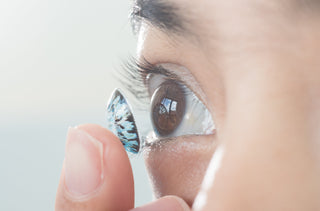All across our big IRIS family, our Optometrists receive many questions from their patients who are concerned with their eye health. There is a lot of misinformation on the Internet and on social media platforms, so our team of professionals always try to give the right information to reassure their patients. We asked Dr. Branwen Phillips, Optometrist at IRIS Qualicum Beach, British-Colombia, to answer the questions that are most frequently asked in her office.
What are cataracts? Do I have one?
A cataract is a cloudiness or opacity in the natural lens of the eye. The eye’s natural lens is responsible for changing the focus of the eye and helping to protect the retina (and our long-term vision) by absorbing UV light. As the lens absorbs UV light, the fibres slowly yellow. This yellowing forms the most common type of cataract, known as nuclear sclerosis. If we live long enough, we will eventually develop this kind of cataract. Nuclear sclerosis depends on UV exposure, so this type is fairly predictable, at any given age, how much yellowing is average. As an optometrist, I will record a grading of how yellow a patient’s lens has become long before I label it a cataract. Discussion of surgery is unnecessary until the cloudiness begins impacting vision or causing glare.
There are many other types of cataracts that can cause a dark spot or opacity in one or more layers of the lens. Although often the cause is unknown, some triggers of cataract formation include: family history, medications or treatments, injury, infections, and disease. Again, like nuclear sclerosis, any cataract will likely be visible to your optometrist long before it causes visual impact.
In conclusion, all adults will likely have some degree of yellowing to their lens but we don’t worry about cataracts unless it is affecting vision. If a cataract is maturing and interfering with clear comfortable vision then a very low risk, day surgery can be arranged.
Will my reading glasses make my eyes worse?
The short answer to this one is no... but it may feel like they have! Let me explain. As we age, the lens in the eye gets thicker and less flexible. Eventually, it becomes harder for our eye muscles to force it to change shape and focus. As the lens becomes less able to adjust shape, we lose the ability to focus on very near things. This is an extremely gradual change that takes place over many years. Eventually, both focusing and sustaining focus become difficult (usually in our early 40s). When someone first starts to struggle with reading, the magnification they need is low. This low power magnification helps the eye with a little bit of the focusing demand.... just enough to make reading comfortable. The eye will, however, naturally continue to get weaker. Within a couple of years, a slightly stronger reading glass prescription is needed. This gradual increase in the amount of visual help needed to read comfortably will continue for 10-15 years. Eventually, reading without glasses becomes very difficult.
This is where the confusion lies. It can feel like the eyes were okay, but then when reading glasses were used, the eyes just kept getting weaker until now reading glasses are needed all the time! And this is true...but the glasses didn’t cause the decline!!! With or without glasses, as our eyes age, they will slowly become weaker, and less able to focus on near tasks. Reading glasses are just a tool to make you more comfortable, and allow you to continue to enjoy your reading, crosswords, and texting...as your eyes go on subtly changing on their own.
What can I do to protect my vision?
Vision is precious and knowing how to look after your eyes is important. Here are some basic steps to looking after your eye health.
- Make sure to schedule regular eye exams. This will ensure that you are assessed regularly for eye disease and disease risk factors. It will also give you an opportunity to ask questions and get up-to-date information about disease prevention from your eye care provider.
- Do your best to live a healthy lifestyle. This includes eating a range of colourful fruits and vegetables, exercising regularly, staying hydrated, avoiding smoking, and taking vitamins when indicated.
- Wear sunglasses. UV light exposure is linked to many eye diseases. Wearing sunglasses will keep your eyes and the surrounding tissues healthier for longer.
- Be sure to apply a blue filter or “Night Mode” to all of your electronic devices, and try to balance screen time with healthy outdoor eye experiences...with sunglasses, of course!





















































